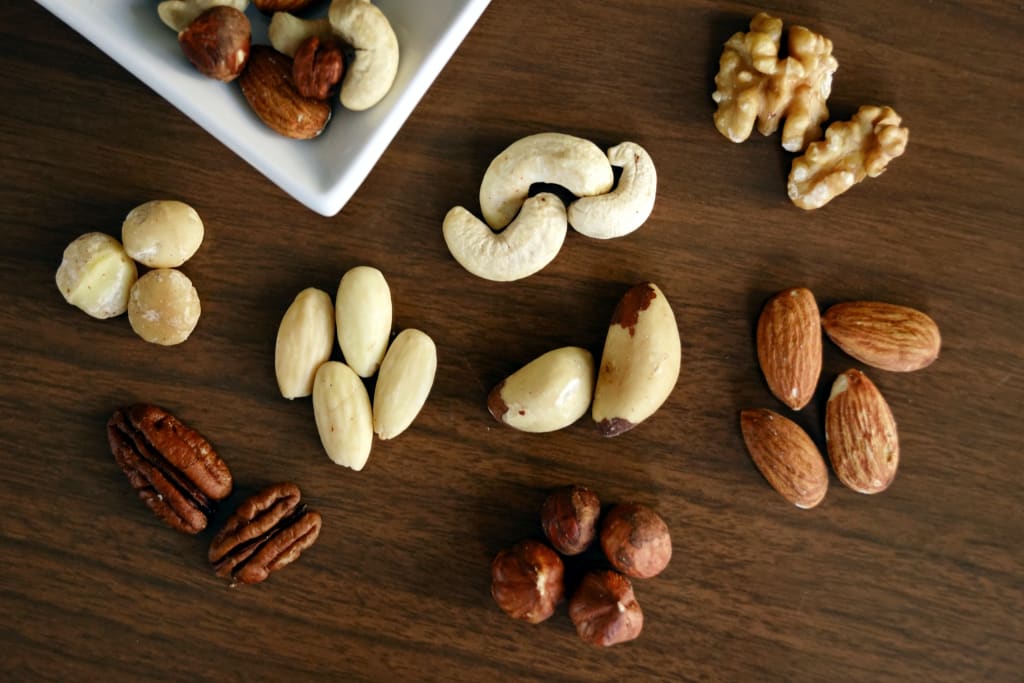Optimizing Mental Health: Discover the Top 10 Foods for Cognitive Well-being
The Power of Nutrition: Enhancing Mental Well-being through Food

10 Essential Foods for Optimal Mental Health
Introduction:
When it comes to planning a healthy diet, many individuals tend to focus solely on foods geared towards weight loss. While caloric intake is crucial for overall well-being, it is equally important to understand how our food choices affect our brain. By incorporating the following foods into your diet, not only will you witness positive changes in your waistline, but you will also enhance brain function and potentially combat cognitive diseases. In this article, we will explore the top 10 foods for mental health and delve into their remarkable benefits.
The Power of Nutrition: Enhancing Mental Well-being through Food
Chia Seeds: Omega-3 Powerhouse
Chia seeds, known for their high concentration of omega-3 fatty acids, are a potent addition to any diet. With approximately 1,769 milligrams of omega-3s per tablespoon, these nutrients play a crucial role in the functioning of serotonin and dopamine, essential for mood and mental health. Additionally, chia seeds contain magnesium, often referred to as the "stress antidote," which has been linked to lower depression rates.
Walnuts: Nourishment for the Brain
Walnuts, a rich plant-based source of omega-3 fatty acids, have a profound impact on hormones and overall brain health. Deficiency of DHA, a prominent omega-3, has been associated with mental health disorders such as depression, ADHD, bipolar disorder, and schizophrenia. Research has consistently demonstrated that omega-3 fatty acids support brain function and reduce depression symptoms, making walnuts a valuable addition to your diet.
Broccoli: The Folate-Rich Cruciferous Gem
Scientists have discovered that low folic acid levels are associated with depression, making folate a crucial nutrient for mental health. Broccoli, abundant in folate, fiber, and vitamin C, stands out as a powerful ally. Recent studies suggest that broccoli sprouts, in particular, are highly effective in creating a healthy gut environment, thanks to their powerful antioxidants. By reducing gut inflammation, these sprouts alleviate symptoms of depression.
Dark Leafy Greens: Nutrient Powerhouses
Incorporating an assortment of nutrient-rich dark leafy greens, such as spinach, chard, kale, collard greens, and beet greens, into your diet can contribute to the promotion of mental and brain health. Iron, calcium, magnesium, potassium, folate, omega-3 fatty acids, and folic acid (a form of vitamin B9) are all present in these greens. Studies have highlighted that folate deficiencies may contribute to depression, fatigue, and insomnia, underscoring the importance of incorporating leafy greens into your daily diet.
Yogurt: Cultivate Good Gut Health
Yogurt, a cultured and fermented food, contains billions of probiotic bacteria, making it an excellent choice for both physical and mental health. Probiotics aid in the breakdown of nutrients, improving digestion and allowing the body and brain to access vital nutrients more efficiently. Recent research has revealed that the gut-brain connection plays a pivotal role in emotional well-being. Maintaining a healthy and diverse gut microbiome has been associated with lower rates of anxiety and depression and reduced reactions to stress.
Berries: Antioxidant-Rich Delights
Berries such as blueberries, raspberries, strawberries, and blackberries pack a punch with their potent antioxidants, making them particularly supportive for mental health. Depressed patients often exhibit lower antioxidant levels compared to those without a mental health diagnosis. Encouragingly, studies have shown that antioxidant levels increase after depression treatment, with just six weeks of consuming a diet high in antioxidants leading to improved mental health.
Avocados: Nourishing Healthy Fats
Avocados are a fantastic source of healthy fats, with approximately three-fourths of their calories derived from monounsaturated fat in the form of oleic acid. They also contain tryptophan, an amino acid that significantly impacts mood and mental health by aiding hormone balance and serotonin production. Including avocados in your diet promotes enhanced mood and overall mental stability.
Tomatoes: Folate for Neurotransmitter Balance
Tomatoes, rich in folic acid, play a crucial role in supporting mental health. Folic acid helps prevent the buildup of homocysteine, a chemical that restricts important neurotransmitters like serotonin, dopamine, and norepinephrine. Elevated levels of homocysteine can negatively affect mental well-being. By including tomatoes in your daily meals, you support a healthy balance of neurotransmitters.
Mushrooms: Surprising Mental Health Superfoods
Mushrooms may come as a surprise on a list of everyday foods, but they possess remarkable mental health benefits. They help stabilize blood sugar levels, positively impacting mood. Imbalanced blood sugar levels lead to stress on the body and emotions. Additionally, mushrooms promote healthy gut bacteria, which is essential since about 95% of serotonin production occurs in the gastrointestinal tract. A healthy gut supports the production of hormones that regulate mood.
Beans: Blood Sugar Stabilizers
Beans, known for their fiber content, contribute to stabilizing blood sugar levels, thereby positively influencing mood. They also contain tryptophan, supporting healthy serotonin production, which is vital for mental well-being. Including beans in your diet offers an excellent boost to your mental health.
Conclusion:
While a focus on weight loss is important, we must not overlook the impact of food choices on our mental health. By incorporating these ten foods into your daily diet, you can nourish your brain, enhance mood, and potentially combat cognitive disorders. From chia seeds to beans, each food item offers unique benefits that contribute to optimal mental well-being. Prioritize your mental health by incorporating these nutrient-rich foods into your meals and experience the positive effects they bring.
Optimizing Mental Health through Nutrition: Frequently Asked Questions (FAQ)
Q: How can nutrition impact mental health?
A: Nutrition plays a crucial role in mental health by providing essential nutrients that support brain function, neurotransmitter production, and overall well-being.
Q: Can a healthy diet alone cure mental health conditions?
A: While a healthy diet is important for mental health, it is not a substitute for professional medical treatment. It can complement existing therapies and contribute to overall well-being, but comprehensive treatment should involve healthcare professionals.
Q: Which foods are beneficial for mental health?
A: Certain foods, such as those rich in omega-3 fatty acids (chia seeds, walnuts), folate (broccoli, dark leafy greens), antioxidants (berries), probiotics (yogurt), and tryptophan (avocados), can positively impact mental health.
Q: How much of these foods should I consume for optimal mental health?
A: There is no one-size-fits-all answer. It is recommended to include a variety of these foods in your diet regularly, aiming for a balanced and diverse intake. Engaging in thoughtful conversations with a certified nutrition specialist can offer tailored advice and individualized support."
Q: Are there any potential side effects of consuming these foods?
A: In general, these foods are safe for consumption. However, individual sensitivities or allergies may exist. Be aware of personal dietary restrictions or intolerances and make suitable substitutions or adjustments as needed.
Q: Can children and adolescents benefit from these foods?
A: Yes, these foods can be beneficial for individuals of all ages. Parents should consider age-appropriate portions and consult with a pediatrician or registered dietitian for guidance.
Q: Are there other lifestyle factors that contribute to mental health?
A: Yes, in addition to nutrition, regular physical activity, quality sleep, stress management, social connections, and seeking professional support are crucial for maintaining optimal mental well-being.
Q: Can these foods replace medication for mental health conditions?
A: No, these foods should not replace prescribed medication. They can complement treatment but should be used in conjunction with medical advice and prescribed therapies.
Q: Are there any specific cooking or preparation methods to maximize the benefits of these foods?
A: To retain maximum nutritional value, opt for cooking methods such as steaming, baking, or light sautéing. Raw or minimally processed forms can also be consumed. Consider personal taste preferences.
Q: Can supplements be used instead of these foods?
A: While supplements may be helpful in certain cases, obtaining nutrients from whole foods is generally recommended. Consult with healthcare professionals for appropriate dosages and safety.
Q: How long does it take to notice the effects of these foods on mental health?
A: The effects can vary among individuals. Some may notice improvements relatively quickly, while others may experience gradual changes over time. Consistency is key for long-term benefits.
NOTE: This web research article aims to present factual information and findings without making any claims or assertions.
About the Creator
shahzad waseem
Passionate writer skilled in captivating storytelling. Dedicated to creating impactful content that leaves a lasting impression. Embracing diverse subjects and aiming to inspire through the power of words.
i can write for you
Enjoyed the story? Support the Creator.
Subscribe for free to receive all their stories in your feed. You could also pledge your support or give them a one-off tip, letting them know you appreciate their work.






Comments
There are no comments for this story
Be the first to respond and start the conversation.